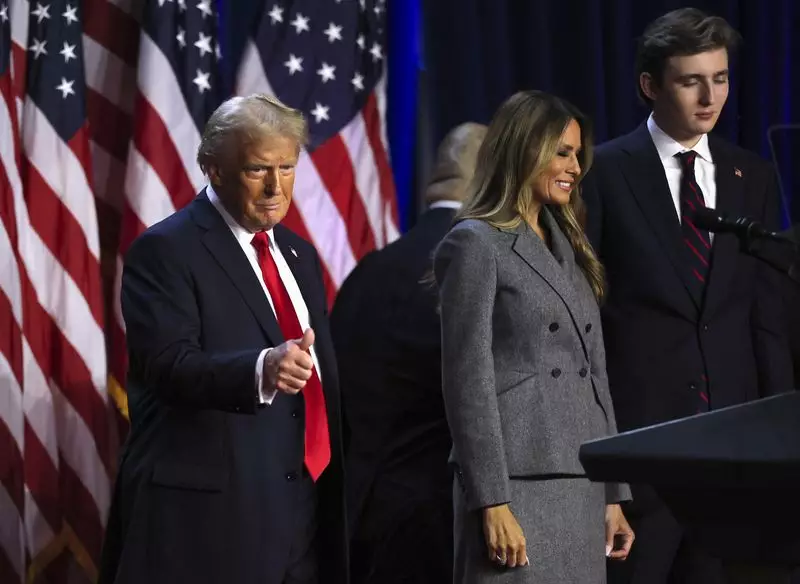The recent presidential election in the United States has reshaped not only the political landscape at home but has significant implications for international affairs, particularly for U.S.-China relations. With Donald Trump emerging triumphant, defeating Democrat Kamala Harris, China is preparing for a renewed phase of competition and contention on multiple fronts, including trade, technology, and national security.
Despite Trump’s unpredicted victory, Chinese analysts had braced themselves for an intense race and understood the implications it would carry for Sino-U.S. relations. The outcome, while not ideal for Beijing, is viewed as a potential opportunity for maneuvering within the chaotic global political landscape. Experts like Tong Zhao of the Carnegie Endowment for International Peace contend that, despite fears of hyperbolic rhetoric and sanctions, the Chinese government might exploit Trump’s isolationist tendencies. This view suggests that rather than being solely adversarial, China may find avenues to reinforce its global standing while the U.S. tends toward a more introverted foreign policy.
China’s leadership is likely to adopt a dual approach: maintaining a façade of cordiality in relationships with Trump while simultaneously consolidating its power projection across the globe. This balancing act is emblematic of how Beijing approaches superpower rivalry, situating itself as a confident actor poised to capitalize on any gaps left by an America that withdraws from international commitments.
The Tariff Tango: Economic Challenges Looming Large
Central to the new administration’s policy arsenal is the looming threat of steep tariffs on Chinese imports, a proposal that has the Chinese leadership on high alert. Analysts have voiced concerns over Trump’s intent to escalate trade tensions, potentially imposing tariffs exceeding 60%, which would invariably impact China’s economy, particularly as it strives to avert internal crises. With over $400 billion in goods flowing from China to the U.S., the potential for a trade war poses not just economic setbacks but could also destabilize the social fabric of Chinese society.
As pressures mount, Beijing is expected to reinforce its strategic initiatives toward economic self-reliance. This strategy of economic independence is seen as not only a reactionary measure but also a proactive step to diminish vulnerability amid rising external pressures. Analysts like Brian Wong from the University of Hong Kong emphasize that China is likely to engage in deliberate trade-offs with the U.S. in pursuit of its domestic economic stability, while cautiously eyeing Trump’s unpredictable policy implementations.
In the broader theatre of global politics, Trump’s victory might open avenues for China to augment its strategic relationships with nations deemed essential in what analysts describe as emerging power vacuums. Given Trump’s transactional and often isolationist foreign policy stance, countries such as those in the Global South, Europe, and Northeast Asia may find themselves drawn closer to Beijing. Recent diplomatic engagements between Chinese President Xi Jinping and Indian Prime Minister Narendra Modi are indicative of the potential for increased collaboration across regional lines, previously marked by discord.
China’s expectation for greater global influence comes hand-in-hand with a likely reduction in international engagements from the U.S. By default, this creates unfilled niches in international leadership that China is poised to fill. Such dynamics could lead to a transformative shift in global alliances, where nations reconsider their allegiances in light of an inward-looking American policy.
Moreover, Trump’s approach to Taiwan could be one of the most contentious aspects of U.S.-China relations going forward. His administration’s critical rhetoric toward the island, coupled with military support from the U.S., has irked Beijing, which views Taiwan as integral to its sovereignty. The stark contrast between Trump’s loose handling of Taiwan and Biden’s protocol-driven military involvement may exasperate existing tensions.
In this fraught context, many analysts anticipate a further distancing of China from U.S. influence in the region, with possible fallout affecting not only Taiwan but also cross-strait relations. The approval of arms sales to Taiwan reflects a shift in U.S. strategy which may provoke aggressive countermeasures from China, intensifying disputes over regional security and sovereignty.
As the global community watches the unfolding of this new chapter in U.S.-China relations under Trump, it becomes evident that both challenges and opportunities lie ahead. Beijing, while wary of Trump’s aggressive strategies, may yet find pathways to enhance its standing in a world increasingly defined by rivalry and competition. The dance of diplomacy and economic strategy promises to be intricate, with significant implications for global stability in the years to come. Both nations will need to navigate this complex landscape with an acute awareness of the future they are crafting, not only for themselves but for the world.

